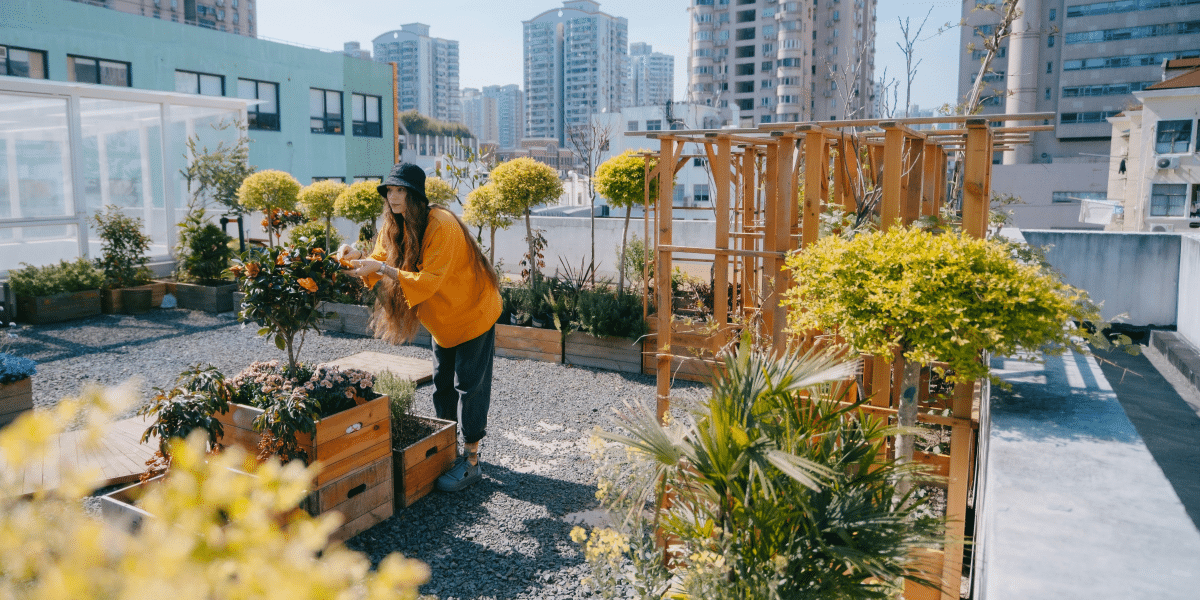As cities grow and green spaces shrink, urban gardening is becoming popular. It allows city dwellers to reconnect with nature and cultivate their own little oasis. Urban gardening transforms rooftops, balconies, and even small apartment spaces into lush, productive areas where people can grow everything from herbs and flowers to fruits and vegetables. Beyond beautifying the city, urban gardening brings many benefits, including improved mental health, sustainable food production, and a sense of community among urban residents.
Mental Health Benefits of Urban Gardening
Gardening has long been known to promote mental well-being, and urban gardening is no exception. Spending time nurturing plants, digging in the soil, and being outdoors reduces stress and provides a therapeutic break from daily pressures. Studies show that gardening can reduce symptoms of anxiety and depression, creating a calming effect and promoting mindfulness.
Gardening also allows people to unplug from screens and technology, providing a much-needed break in today’s fast-paced world. Even brief gardening sessions can improve mood and mental clarity, allowing people to return to their daily routines with a refreshed mind and a renewed sense of calm.
Growing Your Food in the City
One of the most practical benefits of urban gardening is the opportunity to grow your food. Urban gardens offer a sustainable way to produce herbs, vegetables, and fruits, reducing the need for grocery store trips and ensuring fresh, organic ingredients are suitable at home. Growing food is economical and environmentally friendly for city dwellers, as it reduces the carbon footprint associated with transporting produce.
Urban gardening allows people to experiment with growing a wide range of edible plants, from small herbs like basil and cilantro to vegetables like tomatoes, lettuce, and peppers. Even those with limited space can grow food in containers, vertical gardens, or hydroponic systems, making it accessible to anyone wanting to cultivate fresh, healthy produce.
Building Community Through Shared Gardening Spaces
Urban gardening has a unique way of bringing people together. Community gardens, where residents share a larger gardening space, allow people to meet, learn from each other, and work together toward a common goal. These shared gardens foster a sense of belonging and provide a place for residents to connect, build friendships, and support each other.
Community gardens often organize events, workshops, and activities, providing education on gardening techniques, sustainability practices, and nutrition. For urban areas with limited green spaces, these gardens become vital gathering places encouraging collaboration, skill-sharing, and a strong sense of community among residents.
The Environmental Impact of Urban Gardening
Urban gardening contributes to environmental health by creating pockets of green that help purify the air, reduce heat, and support local biodiversity. Plants naturally absorb carbon dioxide and release oxygen, improving air quality, which is especially valuable in densely populated cities. Urban gardens can also reduce the urban heat island effect, as plants and soil help cool the surrounding area, offering relief from concrete-heavy environments.
Starting Your Own Urban Garden
Urban gardening doesn’t require a large backyard; even a tiny balcony or windowsill can be transformed into a thriving green space. Consider the available space and the amount of sunlight it receives. Many plants thrive in containers and vertical gardening systems, making it easy to adapt to even the smallest spaces for gardening.
Begin with plants that are easy to grow and maintain, such as herbs like basil, mint, and rosemary, which do well in small containers and don’t require extensive care. For vegetables, lettuce and radishes are ideal for beginners as they increase and are suited to containers. As you gain confidence, experiment with new varieties and techniques, and consider expanding to vertical or hanging gardens for added greenery.
Making Gardening Sustainable in Urban Settings
Sustainable gardening practices make urban gardening even more rewarding. Using recycled containers, composting kitchen scraps, and conserving water with drip irrigation systems are all ways to make gardening more eco-friendly. Rainwater collection is another sustainable practice, as it reduces reliance on city water systems and provides plants with untreated, mineral-rich water.
Embracing the Joy of Urban Gardening
Urban gardening allows city dwellers to experience the joy and rewards of growing plants, even in limited spaces. This practice combines sustainability, creativity, and wellness, helping people connect with nature meaningfully. Beyond its practical benefits, urban gardening encourages mindfulness and patience, as tending to plants reminds us to slow down and appreciate the simple, natural beauty around us.
For those seeking balance and tranquility amid the busy rhythms of city life, urban gardening provides a peaceful, fulfilling escape. Whether growing herbs on a windowsill or tending to a community garden plot, the joy of nurturing life and watching it thrive can bring a sense of purpose and connection that enriches life in the city.
Published by: Annie P.








